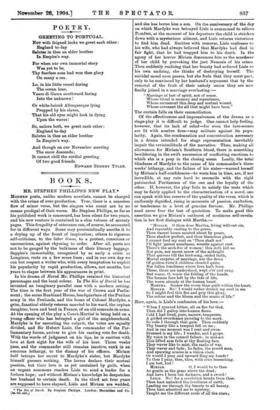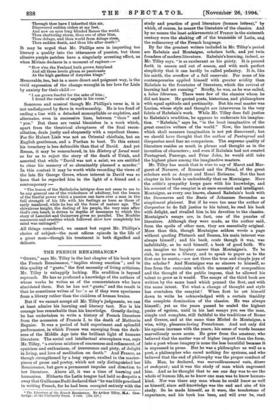MODERN poets, unlike modern novelists, cannot be charged with the
crime of over-production. True, there is a ceaseless flow of minor verse, but the singers who count are by no means prodigal of their wares. Mr. Stephen Phillips, so far as his published work is concerned, has been silent for two years, and his new venture is contained in a slim volume of seventy pages. This frugality of utterance can, of course, be accounted for in different ways. Some may pessimistically ascribe it to a drying up of the fount of inspiration; others to rigorous self-criticism, to the labor Ulnae, to a protest, conscious or unconscious, against rhyming to order. After all, poets are not to be gauged by the bulkiness of their literary baggage. Sappho's immortality, recognised by so early a critic as Longinus, rests on a few score lines ; and in our own day we can but respect a writer who, with every temptation to exploit his popularity by rapid production, allows, not months, but years to elapse between his appearances in print.
In his drama of Herod Mr. Phillips retained the historical personages and the local colour. In The Sin of David he has invented an imaginary parallel case with a modern setting. The time is the first year of the war of Crown and Parlia- ment; the scene Rushland House, headquarters of the Puritan army in the Fenlands, and the home of Colonel Mardyke, a grim, fanatical elderly veteran married to his ward, the orphan daughter, born and bred in France, of an old comrade-in-arms. At the opening of the play a Court-Martial is being held on a young officer who has betrayed a girl of the neighbourhood. Mardyke is for executing the culprit, the votes are equally divided, and Sir Hubert Lisle, the commander of the Par- liamentary forces, arrives to give his casting vote for death. With the words of judgment on his lips, he is smitten with love at first sight for the wife of his host. Three weeks pass, and the commander still remains inactive, sunk in an amorous lethargy', to the dismay of his officers. Miriam half betrays her secret to Mardyke's sister, but Mardyke himself guesses nothing. The lovers declare their mutual passion, but their love is as yet unstained by guilt, when an urgent summons reaches Lisle to send a leader for a forlorn hope ; and without Miriam's knowledge he despatches her husband to certain death. In the third act four years are supposed to have elapsed, Lisle and Miriam are wedded, • The Sin of David. By Stephen Phillips. London: Macmillan and Co. [4a. ad. netd Pomfret, at the moment of his departure the child is stricken down with a mysterious ailment, and Lisle returns victorious to find him dead. Smitten with remorse, Lisle confesses to his wife, who had always believed that Mardyke had died in fair fight, that he had trapped him to his death. In the agony of her horror Miriam denounces him as the murderer of her child by provoking the just Nemesis of his mime. Then suddenly realising that her beauty had seduced Lisle to his own undoing, she thinks of destroying herself. The suicidal mood soon passes, but she feels that they must part, only to be convinced by her husband's argument that by the removal of the fruit of their unholy union they are now finally joined in a marriage everlasting :— " Marriage at last of spirit, not of sense, Whose ritual is memory and repentance, Whose sacrament this deep and mutual wound, Whose covenant the all that might have been."
The curtain falls on their reconciliation.
Of the effectiveness and impressiveness of the drama as a stage-play it is difficult to judge. One cannot help feeling, however, that its lack of relief—for even the love-scenes are lit with sombre fires—may militate against its popu- larity. Again, the condensation and concentration necessary in a drama intended for stage representation inevitably impair the verisimilitude of the narrative. Thus, making all allowances for Miriam's Southern blood, there is something bewildering in the swift succession of conflicting emotions to which she is a prey in the closing scene. Lastly, the total blindness of Mardyke to the cause of his commander's three weeks lethargy, and the failure of his sister—warned herself by Miriam's half-confidences—to warn him in time, are, if not incredible, at any rate hard to reconcile with the rigid patriarchal Puritanism of the one and the loyalty of the other. If, however, the play fails to satisfy the tests which may be fairly applied to the characterisation of a novel, one can speak with less reserve of the quality of the verse, which is uniformly dignified, rising in moments of passion, exaltation, or tenderness to a level of genuine fervour. Mr. Phillips need never fear the test of quotation. To make good this assertion we give Miriam's outburst of mutinous self-revela- tion in her first dialogue with Martha:—
- MIRIAM% 0 thou dear Martha, living without sin,
And reputably rusting to the grave, Thou vacant house moated about by peace, Thou shadow perfect, and thou blameless ghost, I cannot feed my soul on ' Thou shalt not.'
I'll fight 'gainst numbness, wrestle against rust.
There's the arch-foe of women ! this doth kill us.
Not pain, nor secret arrow of the midnight That quivers till the bird-song, ended faith, Mortal surprise of marriage, nor the dawn Of golden-vista'd children clouded quite, Nor fallen loneliness where love hath been.
These, these are understood, wept o'er and sung. But worse, 0, worse the folding of the hands, The human face left by the tide of life, The worm already at the human heart.
MARTHA. Sooner the worm than guilt within the heart.
MIRIAM. No ! I would rather drench my soul in sin
So I might feel this fire and grip this glory, The colour and the bloom and the music of life."
Here, again, is Lisle's confession of his love :—
" When I spurred hither, all on fire for God, Then did I gallop into human flame. Cold I had lived, pure, narrow, temperate, A girded swordsman pressing to the mark. So rode I through that gate. Then suddenly Thy beauty like a tempest fell on me ; And in one moment was I rent and riven. Stunned is my life; I wander, and I grope. My voice in the council falters; in mid-act This lifted arm falls at thy floating face. They waver like to mist, the ranks of war, They waver and fade; he fades, the armed man, And spurring armies in a. vision clash. Or would I pray and upward fling my hands ? To thee I pray, thee, thee, with cries beseeching. I am lost, lost !
MIELUr. 0, I would be to thee As gentle as the grass above the dead;
And have I been but darkness, and a sword?
LISLE. No ! for a revelation breaks from thee. Thou hast unlocked the loveliness of earth, Leading me through thy beauty to all beauty. Thou haat admitted me to mystery, Taught me the different souls of all the stars;
And now on eyes long blinded flames the world. Thou shattering storm, thou eve of after blue, Thou deluge, and thou world from deluge risen, Thou sudden death, and thou life after death 1" It may be urged that Mr. Phillips errs in importing too literary a quality into the utterances of passion, but these allusive purple patches have a singularly arresting effect, as when Miriam declares in a moment of rapture :— " How e'en the Fenland hath grown fairyland And all these levels gleam as passionate As the high gardens of Assyrian kings " Memorable, too, but in a more direct and poignant way, is the vivid expression of the change wrought in her love for Lisle by anxiety for their child :—
" I am grown fearful for the sake of him ; I dread the rustle of angels in his room."
Sonorous and musical though Mr. Phillips's verse is, it is not undisfigured by flaws in workmanship. He is too fond of ending a line with a detached monosyllable or expletive, and alternates, even in successive lines, between " thou " and " you." But these are venial blemishes in a work which, apart from the theatrical abruptness of the final recon- ciliation, deals justly and eloquently with a repellent theme. For Sir Hubert Lisle was not an Oriental chieftain, but an English gentleman, and a Puritan to boot. To this extent his treachery is less defensible than that of David. And yet Renan, it may be remembered, in his History of Israel went so far as to reject the story of the death of Uriah, and asserted that while "David was not a saint, we are entitled to clear his memory of so abominably planned a murder." In this context it may be worth while recording the views of the late Sir George Grove, whose interest in David was so keen that he regarded him in the light of a friend and a contemporary :-
" The lesson of the Bathsheba intrigue does not seem to me to be any general one of the wickedness of adultery, but the lesson of the fearful power which a passion can have over a man in the full strength of his life with his feelings as keen as those of early manhood, while he has all the force of mature age. The chivalrous knight, the darling of his people, the very man after God's own heart, is driven to depths of meanness to which the story of Lancelot and Guinevere gives no parallel. The Moabite massacres and cruelties which followed show how completely his mind was unhinged."
All things considered, we cannot but regret Mr. Phillips's choice of subject—the most odious episode in the life of a great man—though his treatment is both dignified and delicate.
THE FRENCH RENAISSANCE.*















































 Previous page
Previous page